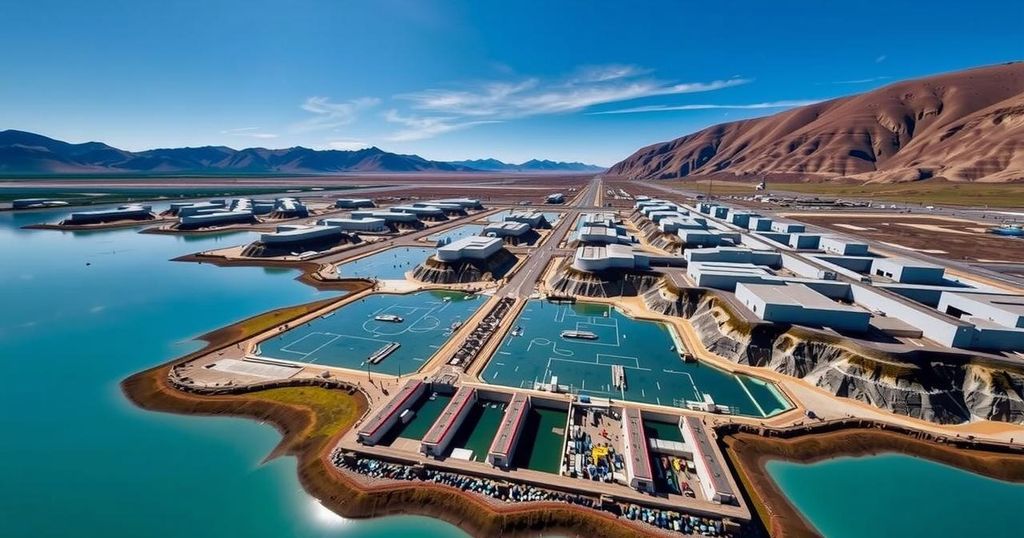Bolivia Seals $1 Billion Deal with China for Lithium Development
Bolivia has secured a $1 billion agreement with China’s CBC to develop two lithium carbonate plants, expected to produce 35,000 metric tonnes annually using innovative DLE technology. The move positions Bolivia to reinforce its influence in the global lithium market, but political hurdles and reliance on foreign investment could pose risks to its economic autonomy.
On November 26, Bolivia formalized a significant $1 billion agreement with China’s CBC subsidiary, part of battery manufacturer CATL, to construct two lithium carbonate plants in the Uyuni salt flats. This initiative aims to enhance Bolivia’s standing in the global lithium market, aspiring to leverage its extensive reserves, despite past difficulties in resource management. The plants are projected to yield a collective production of 35,000 metric tonnes of lithium per year, employing cutting-edge direct lithium extraction (DLE) technology for more efficient and eco-friendly production. Bolivian state-owned company YLB will hold a controlling 51% share in the project, ensuring national oversight and protection of its lithium resources.
Bolivia’s President Luis Arce heralded this agreement as a pivotal achievement in the nation’s pursuit to assert a dominant position in the international lithium landscape, stressing its far-reaching implications for global lithium pricing. Nonetheless, the path forward is complicated by a need for parliamentary endorsement, with concerns regarding potential delays due to Bolivia’s current political fragmentation, particularly with national elections approaching in 2025. Earlier this year, Bolivia also entered into a $976 million partnership with Russia’s Rosatom-owned Uranium One Group, similarly focused on DLE technology, aiming for an annual output of 14,000 tonnes of lithium.
Last year, the Bolivian government engaged CBC and Citic Guoan Group to establish pilot DLE plants, envisaging an eventual transition to large-scale production. Bolivia aims to export 50,000 tonnes of lithium carbonate equivalent annually, reflecting its intent to capitalize on its extensive reserves, which are the largest globally, estimated at 23 million tonnes. However, it has lagged behind regional competitors such as Chile and Argentina due to inadequate infrastructure, regulatory complexities, and political challenges, which have fuelled investor concerns.
Since the 1990s, Bolivia’s efforts to build a robust lithium industry have been impeded by bureaucratic hurdles and logistical challenges. To initiate any operations, companies must navigate strict environmental regulations and secure legislative approvals, a process made more arduous by the country’s existing political disarray and the impending 2025 elections.
The lithium market is increasingly vital, especially as the global demand for electric vehicle batteries and renewable energy technologies surges. Bolivia sits atop the world’s largest lithium reserves, yet its progress in lithium extraction and production has historically been stymied by various internal challenges, including political instability and insufficient infrastructure. The current partnerships with China and Russia represent Bolivia’s attempt to modernize its industries and position itself competitively in the global lithium market, though such collaborations invite scrutiny regarding sovereignty and long-term economic independence.
In conclusion, Bolivia’s $1 billion deal with China’s CBC marks a significant step toward bolstering its presence in the lithium sector amid various challenges. The projected production from these plants may enhance Bolivia’s role in the global market; however, the nation’s dependence on foreign investment, particularly from China and Russia, raises concerns about its economic sovereignty and bargaining power over its vast lithium resources. The advancing technology could streamline production, yet overcoming internal political and regulatory obstacles remains critical to achieving its ambitions.
Original Source: www.intellinews.com








Post Comment